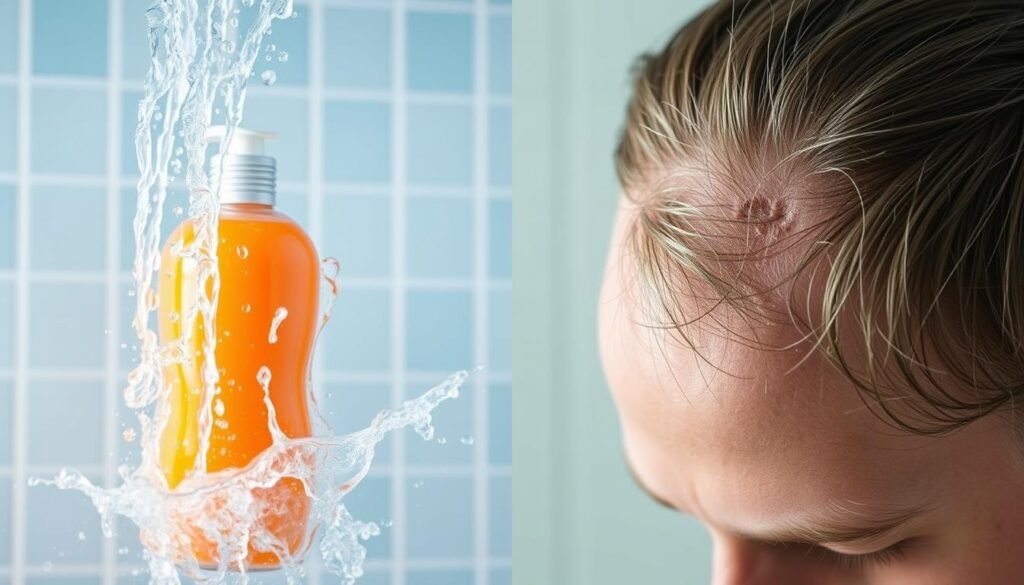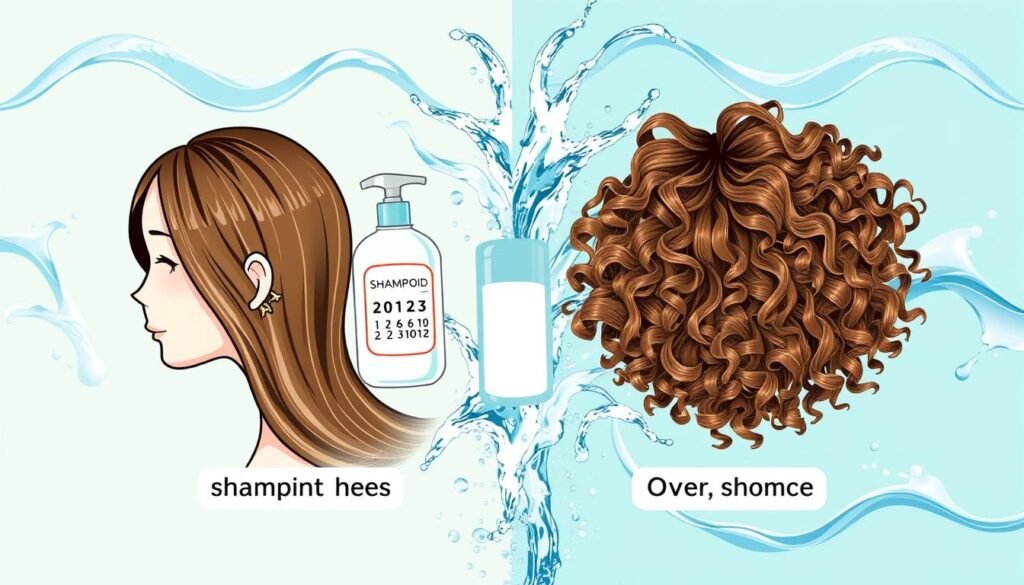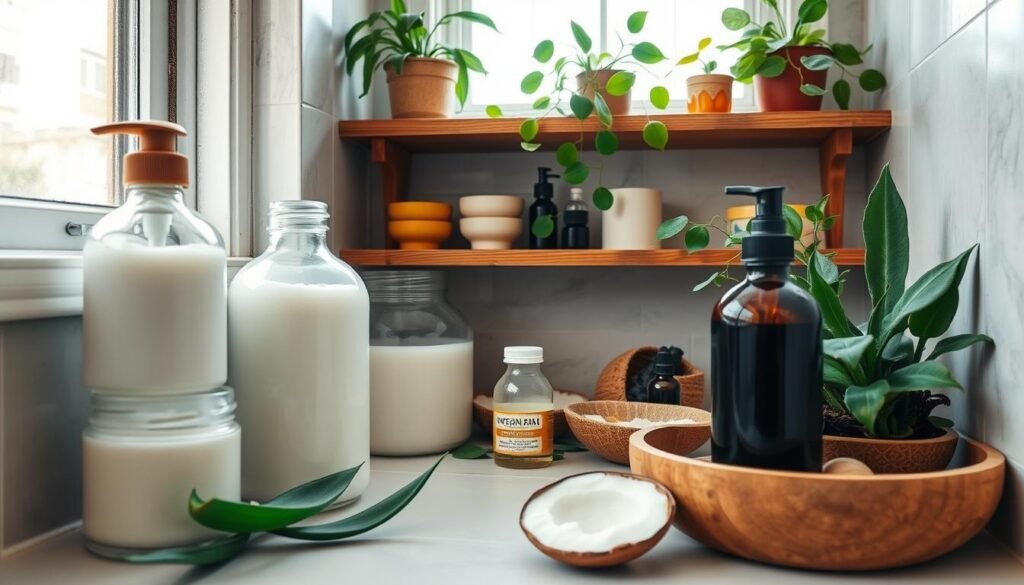Did you know nearly half of adults worldwide have dandruff? It’s often due to too much of the fungus Malassezia Globosa. This issue doesn’t just affect how our hair looks. It can also make us feel anxious because people think it’s a cleanliness problem. Many wonder how often they should wash their hair. The link between too much shampooing and dandruff is not well understood.
In this article, we’ll explore what causes dandruff and the importance of balanced hair care. Washing your hair too much can remove important oils. This makes your body produce more oil, which could actually make dandruff worse.
Key Takeaways
- Dandruff affects about 50% of adults globally, often due to the fungus Malassezia Globosa.
- Washing too often can remove scalp oils, increasing oil production and dandruff.
- It’s best to shampoo 2-3 times a week, depending on your hair type.
- Choosing the right shampoos can effectively manage dandruff, with several active ingredients available.
- Diet and stress management also play a part in keeping your scalp healthy.
Understanding Dandruff and Its Causes
Dandruff is a widespread issue, affecting nearly half the adult population globally. It shows up as white flakes and can make the scalp itchy and irritated. Learning why dandruff happens is key to controlling and treating it.
Common Types of Dandruff
There are mainly two kinds of dandruff: dry scalp dandruff and oily dandruff. Dry scalp dandruff happens when there’s not enough moisture, leading to dry flakes. Oily dandruff is seen in people with seborrheic dermatitis. This condition causes too much oil and fast skin cell turnover, resulting in visible flakes.
Dandruff is more usual in men than women. It can get worse with illnesses like Parkinson’s disease and HIV.
Factors Contributing to Dandruff
Dandruff results from various reasons. Key factors include:
- Oily Scalp: Too much oil can foster a yeastlike fungus, increasing dandruff.
- Dry Scalp: Lack of moisture can cause dry flakes that seem like dandruff.
- Irritated Skin: Conditions like eczema and psoriasis can heighten dandruff problems.
- Environmental Conditions: Dandruff can get worse in cold, dry weather, especially with high stress.
Dandruff starts in young adulthood and might go on into middle age or longer. To treat it, using dandruff shampoos with specific ingredients like ketoconazole or zinc pyrithione helps.
The Role of Sebum in Scalp Health
Sebum is essential for a healthy scalp. It’s a natural oil made by your body. It keeps hair smooth and protects it.
Knowing how sebum works helps you keep your scalp healthy. It’s all about balance for good scalp care.
What is Sebum Production?
Sebum comes from sebaceous glands in your skin, especially on your scalp and face. It’s made of fats, waxes, and cholesterol. Changes in hormones, age, what you eat, and the environment can change sebum levels. For example, puberty increases sebum because of hormone changes. Eating lots of fats and carbs can also raise sebum.
How Sebum Affects Hair and Scalp
Sebum keeps hair healthy but too much can cause issues. Problems like a flaky scalp and oily dandruff may happen. It can clog hair roots, leading to infections or hair loss.
It’s important to wash your scalp regularly to avoid too much sebum. Using natural oils and clarifying shampoos helps balance sebum. Exfoliating your scalp and rinsing with apple cider vinegar fights dandruff. Managing sebum is key to strong, healthy hair.
Importance of Hair Hygiene
Keeping your hair clean is key to a healthy scalp and beautiful hair. Scalp care prevents dandruff and irritation. A quality shampoo removes dirt and excess oils. This way, you can avoid problems caused by buildup on your scalp.
How Shampoo Cleanses the Scalp
Shampoo is crucial for keeping the scalp clean. It removes oils and dirt that cause scalp problems. Bacteria that cause bad smell and dandruff feed on these impurities. So, cleaning your scalp well helps hair grow in a healthy environment. Washing your hair 5 to 6 times a week is good for scalp health, according to research.
Benefits of Regular Washing
Washing your hair regularly has many benefits. How often you should wash depends on your hair type and oiliness. For example, people with very curly hair might only need to wash it once a week. This keeps their hair from getting too dry. No matter your hair type, washing it enough is crucial for controlling oil and fighting dandruff.
Excessive Shampooing and Dandruff
It’s important to understand how too much shampooing and dandruff are linked to keep your scalp healthy. Washing your hair can get rid of dirt and extra oil. But, washing it too much might actually cause problems. One big question is if washing your hair too much leads to dandruff.
Can Overwashing Contribute to Dandruff?
Shampooing is key for keeping clean, but doing it too much can take away natural oils from your scalp. People with oily scalps might wash their hair a lot to control the oil. But, this can make the scalp’s oil glands work overtime. The extra oil makes a perfect place for Malassezia, a fungus that causes dandruff. So, washing your hair too much could actually make dandruff worse.
The Cycle of Oil Production
Washing your hair too much can mess with oil production on your scalp. At first, washing a lot can seem like it helps with too much oil. But in time, it can lead to even more oil as your scalp tries to keep things balanced. This extra oil is not just a problem because it makes your scalp greasy. It also helps create a situation where dandruff can start. It’s key to not overlook the importance of a balanced shampoo routine to avoid these issues.

Recognizing the Signs of Over-Washing
Knowing the signs of too much washing is key for healthy hair and scalp. It may lead to hair loss and an irritable scalp. Spotting these signs means you can change your hair care routine.
Indicators of Damaged Hair and Scalp
Some clear signs may show you’re washing too much. You might see:
- Dry, frizzy hair: Lack of moisture makes hair brittle.
- Increased dandruff: Too much washing disturbs the scalp’s oil, causing flakes.
- Loss of color vibrancy: Over-washing makes hair dull and lifeless.
- Split ends: Shampooing often can make hair weak and break.
- Premature oiliness post-wash: Washing too much makes the scalp produce extra oil.
Common Symptoms to Look For
Other signs you’re over-washing include:
- Itchy scalp: Removing natural oils can irritate the scalp.
- Buildup of product: Too many styling products can weigh down your scalp.
- Hair breakage: Washing your hair too much can lead to breakage.
Knowing these symptoms helps in adjusting hair care to prevent bigger problems. Seeing a professional regularly also helps. For tips on managing dandruff, check out WebMD’s Dandruff Basics.
Shampoo Frequency: Finding the Right Balance
Finding the right balance for shampooing is key for healthy hair and scalp. It depends on your hair type and personal needs. Since everyone’s hair and scalp are different, the frequency of hair washing will vary. We’ll help you find the perfect routine for your hair care.
Recommendations Based on Hair Type
- Dry Hair: It’s best to wash every two to three days to keep hair from drying out further.
- Oily Hair: If you have oily hair, washing daily or every other day might be best.
- Bleached or Colored Hair: Wash less often to keep the color bright and protect your hair.
- Individuals with Dandruff: Wash your hair more often to control dandruff.
- Scalp Psoriasis: Regular washing can help keep the area clean and reduce discomfort.
- Thick or Curly Hair: Once a week may be enough to avoid overwashing.
- Younger Individuals: They often need to wash their hair more due to oilier scalps.
How to Determine Ideal Shampooing Routine
Choosing the best hair care routine depends on your lifestyle and hair type. If you’re active, you might need to wash your hair more to get rid of sweat and dirt. People with thin, straight hair usually need to wash their hair more than those with thick, wavy hair. Also, being in dusty environments or using many hair products can mean you need to wash your hair more.
Experts suggest washing your hair 2-3 times a week to avoid oil build-up. Finding the right shampoo frequency helps keep your scalp healthy and manages issues like dandruff. For more tips, checking out shampooing frequency based on hair type offers more advice.

| Hair Type | Recommended Frequency |
|---|---|
| Dry Hair | Every 2-3 days |
| Oily Hair | Daily or every other day |
| Bleached/Colored Hair | Less frequent |
| Dandruff | Increased frequency |
| Scalp Psoriasis | Frequent washing |
| Thick/Curly Hair | Once a week |
Choosing the Right Products for Hair Care
Selecting the right Hair Care Products is key to controlling dandruff. A good dandruff shampoo can really change things for those dealing with scalp problems. It’s important to know what’s in a Dandruff Shampoo.
How to Pick a Dandruff Shampoo
To choose a good Dandruff Shampoo, look for certain ingredients. Ingredients like ketoconazole, salicylic acid, selenium sulfide, and zinc pyrithione can help a lot. These tackle problems like Malassezia fungus and scalp swelling. Sulfate-free shampoos are gentler, keep more moisture, and are better for sensitive scalps. Learn more about picking the right shampoo here.
Key Ingredients to Look For in Shampoos
When looking at Dandruff Shampoos, focus on those with the right ingredients. Here are some important ones:
| Ingredient | Function |
|---|---|
| Ketoconazole | Antifungal agent effective against dandruff-causing fungi. |
| Salicylic Acid | Helps in removing flakes and exfoliating the scalp. |
| Selenium Sulfide | Reduces scalp inflammation and slows skin cell turnover. |
| Zinc Pyrithione | Combats bacteria and fungi while soothing irritation. |
| Glycerin | Moisturizes and retains hydration on the scalp and hair. |
| Argan Oil | Offers nourishment and enhances shine and elasticity. |
Each ingredient is crucial for keeping hair and scalp healthy. By choosing wisely, you can get closer to a dandruff-free, healthy scalp.
Alternative Hair Care Methods
Looking into other ways to take care of your hair can be exciting. It’s all about keeping your scalp healthy and tackling dandruff in new ways. People are trying Co-Washing and making their Cleansers to use less shampoo. Each choice has its ups and downs to consider.
Co-Washing Benefits and Risks
Co-Washing means you use conditioner instead of shampoo. It’s great for keeping hair moisturized, fighting frizz, and making hair soft. It’s especially good for those with curly or dry hair. But, you have to be careful. Using too much conditioner can cause buildup and might make oily scalp problems worse. It’s important to find the right balance.
Homemade Cleansers and Their Effectiveness
Some people are making their cleansers with things like apple cider vinegar and baking soda. Apple cider vinegar can soothe your scalp but might not be great for everyone. Baking soda may help fight fungus, which is good news for dandruff issues. But remember, these homemade options work differently for everyone. It’s best to try them out and see how they work for you.

Consulting a Professional: When to Seek Help
Dandruff can be tough, especially when home fixes fail. It’s essential to seek Dermatologist Advice for effective control in tougher cases. Persistent dandruff might be a sign of deeper health issues needing a pro’s help.
When to See a Dermatologist
If your dandruff is bad, with lots of itching or red skin, see a dermatologist. They’ll check your scalp and recommend the best treatments. Conditions like seborrheic dermatitis need special care, seen more in some medical conditions. For example, 30-83% of HIV patients get it, way above the 3-5% in others.
Potential Treatments for Severe Cases
There are different treatments for dandruff, depending on how bad it is and what you need. Dermatologists often suggest special shampoos with ingredients like zinc pyrithione, salicylic acid, and ketoconazole. For severe cases, prescriptions might be stronger shampoos or creams to ease swelling.
Some folks might need antifungal pills like fluconazole or terbinafine if trouble continues. Starting treatment early can really help speed up getting better, from a few weeks to longer, based on the treatment.
| Treatment Type | Common Ingredients | Recommended Use |
|---|---|---|
| Over-the-Counter Shampoo | Zinc Pyrithione, Salicylic Acid, Coal Tar | Daily until improvement, then 2-3 times a week |
| Prescription Shampoo | Ketoconazole, Selenium Sulfide | As directed by a dermatologist |
| Topical Treatments | Corticosteroid lotion | For inflamed scalp as needed |
| Oral Medications | Fluconazole, Terbinafine | For persistent dandruff |
Making changes in how you live, like handling stress better and eating well, can also help fight dandruff. If dandruff worries you, getting professional care is a smart move for healthy hair and scalp.
Natural Remedies for Dandruff
Natural remedies are big helpers for fighting dandruff. Trying Tea Tree Oil and Aloe Vera can make a difference. They’re great for scalp health. They calm irritation and keep your scalp healthy.
Options like Tea Tree Oil and Aloe Vera
Tea Tree Oil fights off dandruff thanks to its antifungal properties. It targets the fungus Malassezia globosa. Using this oil in a solution can lower flakes and itchiness. Aloe Vera moisturizes and soothes dandruff irritation. A study showed Aloe Vera gel can help with seborrheic dermatitis. This makes it a good natural treatment.
How Diet Influences Scalp Health
Your diet is key to a healthy scalp. It’s important to get enough omega-3 fatty acids. Adults need from 1.1 to 1.6 grams a day. Eating lots of fruits may help fight off seborrheic dermatitis. A good diet helps your overall health and may lessen dandruff.
Stay away from dairy and spicy foods to better scalp health. This can also help battle dandruff.
Conclusion
Dandruff is common, affecting many of us before we’re even teenagers. It does not matter who you are; it can impact anyone. Even though it’s not harmful to our health, it can make us feel less confident.
Managing dandruff well means keeping our hair clean, but not too clean. Washing too much can actually make things worse. It’s all about finding a good balance.
Understanding how to take care of our scalp is key. Using the right products and some natural treatments can help. Things like pyrithione zinc and tea tree oil are great for fighting dandruff.
To really beat dandruff, stick to a regular hair care plan. Keep an eye on your scalp’s health. And, don’t hesitate to get advice from experts if you need it.
With some time and effort, anyone can improve their scalp health. This leads to less dandruff and more confidence in how we look. It’s all about being patient and following the right steps.